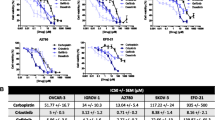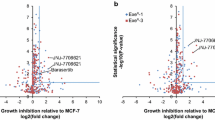Abstract
Purpose
The treatment of ovarian tumors is carried out with platinum medicine which can lead to incompatibilities or resistances. Thus, it is of great interest to check new medicine suitability for its application. AZD1152 is an Aurora kinase inhibitor predominantly works against Aurora kinase B involved in the chromosome segregation. Cells become polyploidy and reduce the proliferation by this impairment. To investigate whether AZD1152, may play a role in the treatment of ovarian carcinoma we serving it to the cisplatinum-resistant cell line SKOV3 alone and in combination with platinum.
Methods
We look at the proliferation, the ploidy, the phases of cell cycle and the apoptosis activity of the cells.
Results and conclusion
We could show that the combination of both medicines in the preclinical experiment produces a working advantage.




Similar content being viewed by others
References
Gautschi O, Heighway J, Mack PC, Purnell PR, Lara PN Jr, Gandara DR (2008) Aurora kinases as anticancer drug targets. Clin Cancer Res Off J Am Assoc Cancer Res 14(6):1639–1648
Tang C-JC, Lin C-Y, Tang TK (2006) Dynamic localization and functional implications of Aurora-C kinase during male mouse meiosis. Dev Biol 290(2):398–410
Chen YJ, Chen CM, Twu NF, Yen MS, Lai CR, Wu HH, Wang PH, Yuan CC (2009) Overexpression of Aurora B is associated with poor prognosis in epithelial ovarian cancer patients. Virchows Arch 455(5):431–440. doi:10.1007/s00428-009-0838-3
Ikezoe T, Takeuchi T, Yang J, Adachi Y, Nishioka C, Furihata M, Koeffler HP, Yokoyama A (2009) Analysis of Aurora B kinase in non-Hodgkin lymphoma. Lab Invest 89(12):1364–1373
Pohl A, Azuma M, Zhang W, Yang D, Ning Y, Winder T, Danenberg K, Lenz HJ (2011) Pharmacogenetic profiling of Aurora kinase B is associated with overall survival in metastatic colorectal cancer. Pharmacogenomics J 11(2):93–99
Esposito F, Libertini S, Franco R, Abagnale A, Marra L, Portella G, Chieffi P (2009) Aurora B expression in post-puberal testicular germ cell tumours. J Cell Physiol 221(2):435–439
Aihara A, Tanaka S, Yasen M, Matsumura S, Mitsunori Y, Murakata A, Noguchi N, Kudo A, Nakamura N, Ito K, Arii S (2010) The selective Aurora B kinase inhibitor AZD1152 as a novel treatment for hepatocellular carcinoma. J Hepatol 52(1):63–71. doi:10.1016/j.jhep.2009.10.013
Kwon YJ, Lee SJ, Koh JS, Kim SH, Kim YJ, Park JH (2009) Expression patterns of aurora kinase B, heat shock protein 47, and periostin in esophageal squamous cell carcinoma. Oncol Res 18(4):141–151
Shen YC, Hu FC, Jeng YM, Chang YT, Lin ZZ, Chang MC, Hsu C, Cheng AL (2009) Nuclear overexpression of mitotic regulatory proteins in biliary tract cancer: correlation with clinicopathologic features and patient survival. Cancer Epidemiol Biomarkers Prev Publ Am Assoc Cancer Res 18(2):417–423. doi:10.1158/1055-9965.EPI-08-0691
Tanaka S, Arii S (2010) Medical treatments: in association or alone, their role and their future perspectives: novel molecular-targeted therapy for hepatocellular carcinoma. J Hepato-Biliary-Pancreatic Sci 17(4):413–419. doi:10.1007/s00534-009-0238-8
Wilkinson RW, Odedra R, Heaton SP, Wedge SR, Keen NJ, Crafter C, Foster JR, Brady MC, Bigley A, Brown E, Byth KF, Barrass NC, Mundt KE, Foote KM, Heron NM, Jung FH, Mortlock AA, Boyle FT, Green S (2007) AZD1152, a selective inhibitor of Aurora B kinase, inhibits human tumor xenograft growth by inducing apoptosis. Clin Cancer Res Off J Am Assoc Cancer Res 13(12):3682–3688. doi:10.1158/1078-0432.CCR-06-2979
Kaestner P, Stolz A, Bastians H (2009) Determinants for the efficiency of anticancer drugs targeting either Aurora-A or Aurora-B kinases in human colon carcinoma cells. Mol Cancer Ther 8(7):2046–2056. doi:10.1158/1535-7163.MCT-09-0323
Girdler F, Gascoigne KE, Eyers PA, Hartmuth S, Crafter C, Foote KM, Keen NJ, Taylor SS (2006) Validating Aurora B as an anti-cancer drug target. J Cell Sci 119(Pt 17):3664–3675. doi:10.1242/jcs.03145
Yang H, Burke T, Dempsey J, Diaz B, Collins E, Toth J, Beckmann R, Ye X (2005) Mitotic requirement for aurora A kinase is bypassed in the absence of aurora B kinase. FEBS Lett 579(16):3385–3391. doi:10.1016/j.febslet.2005.04.080
Gully CP, Zhang F, Chen J, Yeung JA, Velazquez-Torres G, Wang E, Yeung SC, Lee MH (2010) Antineoplastic effects of an Aurora B kinase inhibitor in breast cancer. Mol cancer 9:42. doi:10.1186/1476-4598-9-42
Jemal A, Siegel R, Ward E, Hao Y, Xu J, Thun MJ (2009) Cancer statistics, 2009. CA: Cancer J Clin 59(4):225–249. doi:10.3322/caac.20006
Armstrong DK (2002) Relapsed ovarian cancer: challenges and management strategies for a chronic disease. Oncologist 7(Suppl 5):20–28
Markman M (2008) Pharmaceutical management of ovarian cancer : current status. Drugs 68(6):771–789
Arbitrario JP, Belmont BJ, Evanchik MJ, Flanagan WM, Fucini RV, Hansen SK, Harris SO, Hashash A, Hoch U, Hogan JN, Howlett AR, Jacobs JW, Lam JW, Ritchie SC, Romanowski MJ, Silverman JA, Stockett DE, Teague JN, Zimmerman KM, Taverna P (2010) SNS-314, a pan-Aurora kinase inhibitor, shows potent anti-tumor activity and dosing flexibility in vivo. Cancer Chemother Pharmacol 65(4):707–717. doi:10.1007/s00280-009-1076-8
Lin YG, Immaneni A, Merritt WM, Mangala LS, Kim SW, Shahzad MM, Tsang YT, Armaiz-Pena GN, Lu C, Kamat AA, Han LY, Spannuth WA, Nick AM, Landen CN Jr, Wong KK, Gray MJ, Coleman RL, Bodurka DC, Brinkley WR, Sood AK (2008) Targeting aurora kinase with MK-0457 inhibits ovarian cancer growth. Clin Cancer Res Off J Am Assoc Cancer Res 14(17):5437–5446. doi:10.1158/1078-0432.CCR-07-4922
Fogh J (1975) Human tumor cells in vitro. Plenum Press, New York
The R Project for Statistical Computing. http://www.r-project.org/
Nair JS, de Stanchina E, Schwartz GK (2009) The topoisomerase I poison CPT-11 enhances the effect of the aurora B kinase inhibitor AZD1152 both in vitro and in vivo. Clin Cancer Res Off J Am Assoc Cancer Res 15(6):2022–2030. doi:10.1158/1078-0432.CCR-08-1826
Scharer CD, Laycock N, Osunkoya AO, Logani S, McDonald JF, Benigno BB, Moreno CS (2008) Aurora kinase inhibitors synergize with paclitaxel to induce apoptosis in ovarian cancer cells. J Transl Med 6:79. doi:10.1186/1479-5876-6-79
Li J, Anderson MG, Tucker LA, Shen Y, Glaser KB, Shah OJ (2009) Inhibition of Aurora B kinase sensitizes a subset of human glioma cells to TRAIL concomitant with induction of TRAIL-R2. Cell Death Differ 16(3):498–511. doi:10.1038/cdd.2008.174
Helleman J, van Staveren IL, Dinjens WN, van Kuijk PF, Ritstier K, Ewing PC, van der Burg ME, Stoter G, Berns EM (2006) Mismatch repair and treatment resistance in ovarian cancer. BMC cancer 6:201. doi:10.1186/1471-2407-6-201
Marumoto T, Zhang D, Saya H (2005) Aurora-A—a guardian of poles. Nat Rev Cancer 5(1):42–50. doi:10.1038/nrc1526
Gully CP, Velazquez-Torres G, Shin JH, Fuentes-Mattei E, Wang E, Carlock C, Chen J, Rothenberg D, Adams HP, Choi HH, Guma S, Phan L, Chou PC, Su CH, Zhang F, Chen JS, Yang TY, Yeung SC, Lee MH (2012) Aurora B kinase phosphorylates and instigates degradation of p53. Proc Natl Acad Sci USA 109(24):E1513–E1522. doi:10.1073/pnas.1110287109
Yaginuma Y, Westphal H (1992) Abnormal structure and expression of the p53 gene in human ovarian carcinoma cell lines. Cancer Res 52(15):4196–4199
Hirota T, Kunitoku N, Sasayama T, Marumoto T, Zhang D, Nitta M, Hatakeyama K, Saya H (2003) Aurora-A and an interacting activator, the LIM protein Ajuba, are required for mitotic commitment in human cells. Cell 114(5):585–598
Ouchi M, Fujiuchi N, Sasai K, Katayama H, Minamishima YA, Ongusaha PP, Deng C, Sen S, Lee SW, Ouchi T (2004) BRCA1 phosphorylation by Aurora-A in the regulation of G2 to M transition. J Biol Chem 279(19):19643–19648. doi:10.1074/jbc.M311780200
Boss DS, Witteveen PO, van der Sar J, Lolkema MP, Voest EE, Stockman PK, Ataman O, Wilson D, Das S, Schellens JH (2011) Clinical evaluation of AZD1152, an i.v. inhibitor of Aurora B kinase, in patients with solid malignant tumors. Ann Oncol Off J Eur Soc Med Oncol/ESMO 22(2):431–437. doi:10.1093/annonc/mdq344
Acknowledgments
These studies became financed by annual remedies for research of the state Schleswig–Holstein, assigned to by the Christian-Albrechts-University in Kiel. The Aurora-Kinase inhibitor active drug AZD1152-HQPA was provided to us by the company AstraZeneca UK Ltd., Alderley Park, Cheshire, UK. There is no financial dependence. All primary data are accessible to the authors. A special thanks to Dr. Nicole von Wurmb-Schwark PhD and her colleagues from the Institute of Legal Medicine, University of Kiel for STR fingerprint analysis. For the diction and editing in her mother tongue we are very gratefully to Mrs. Mary Walter.
Conflict of interest
None.
Author information
Authors and Affiliations
Corresponding author
Additional information
Y. Ma and J. Weimer contributed equally to this article.
N. Arnold and C. Schem shared senior authorship.
Rights and permissions
About this article
Cite this article
Ma, Y., Weimer, J., Fredrik, R. et al. Aurora kinase inhibitor AZD1152 has an additional effect of platinum on a sequential application at the human ovarian cancer cell line SKOV3. Arch Gynecol Obstet 288, 173–182 (2013). https://doi.org/10.1007/s00404-013-2719-x
Received:
Accepted:
Published:
Issue Date:
DOI: https://doi.org/10.1007/s00404-013-2719-x




